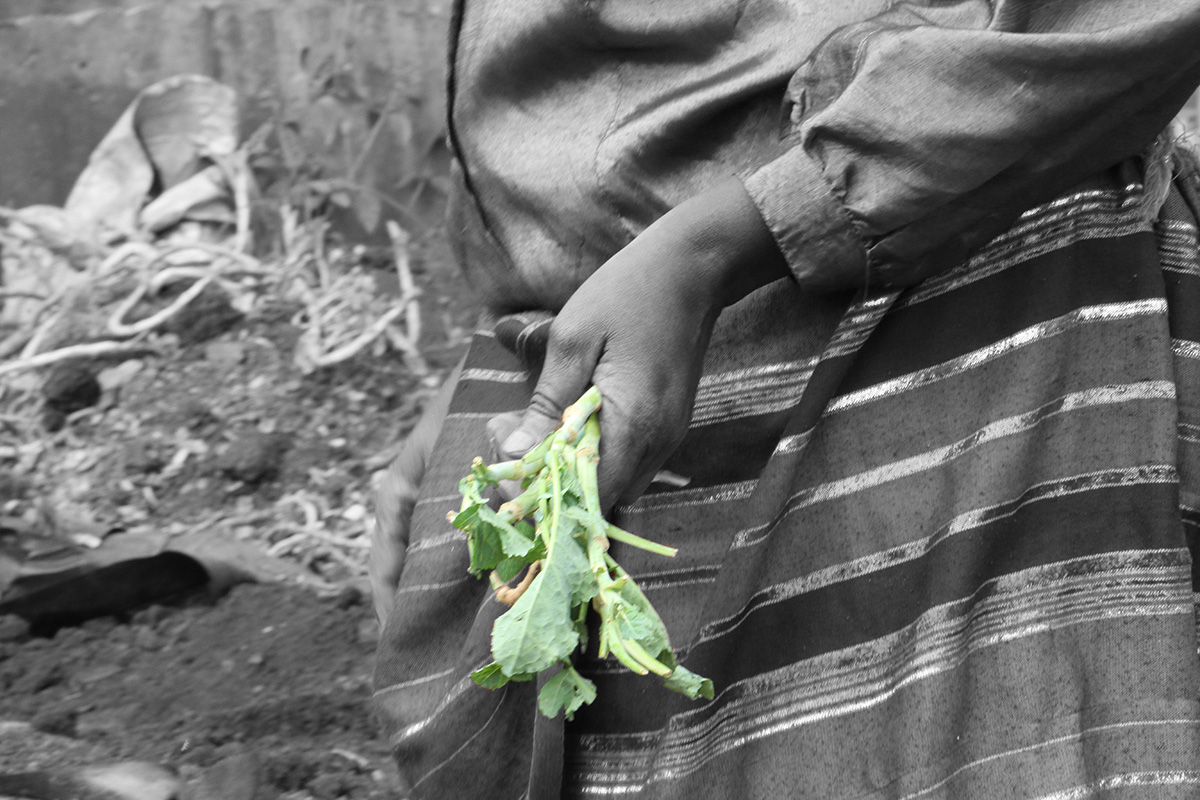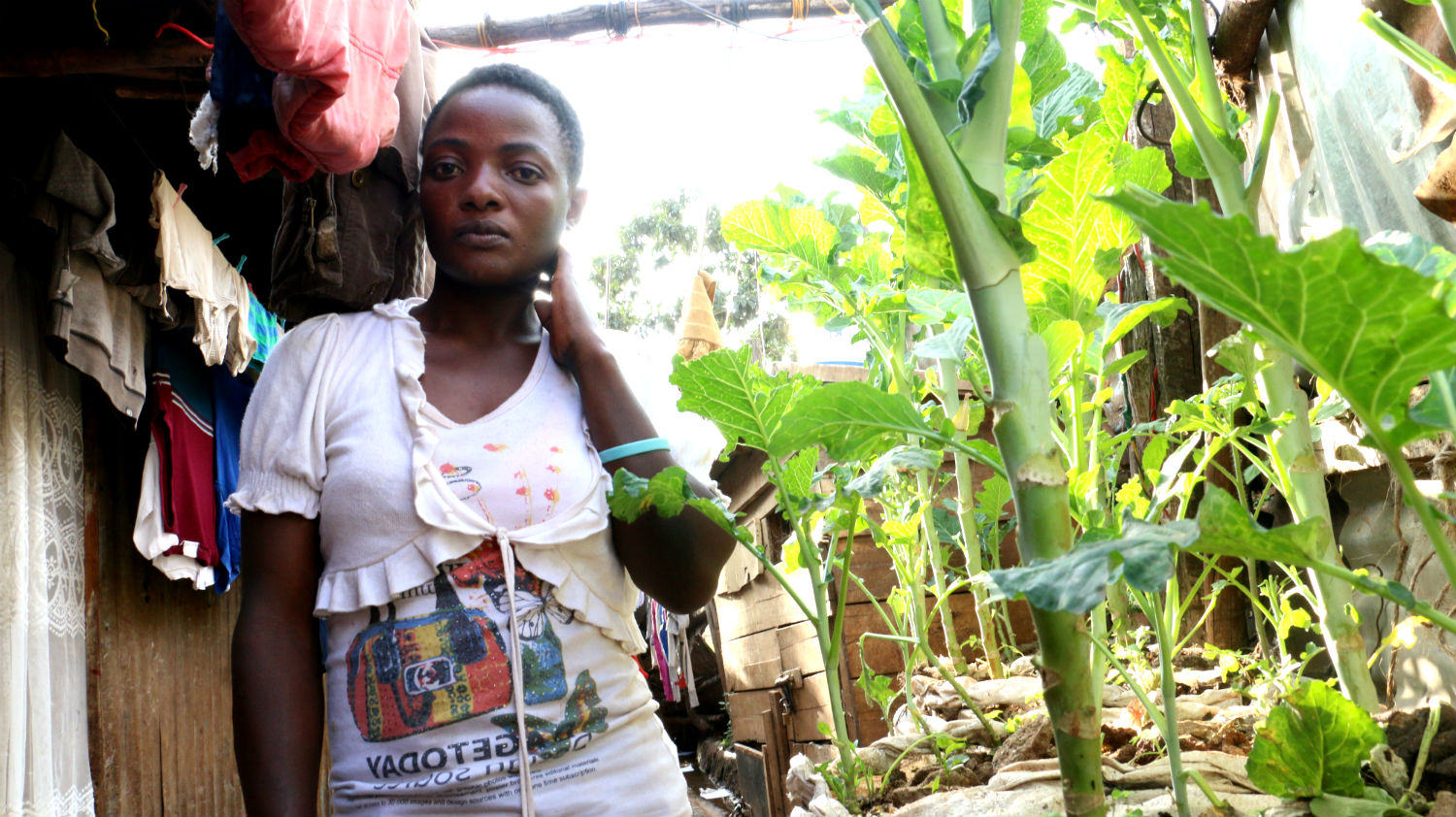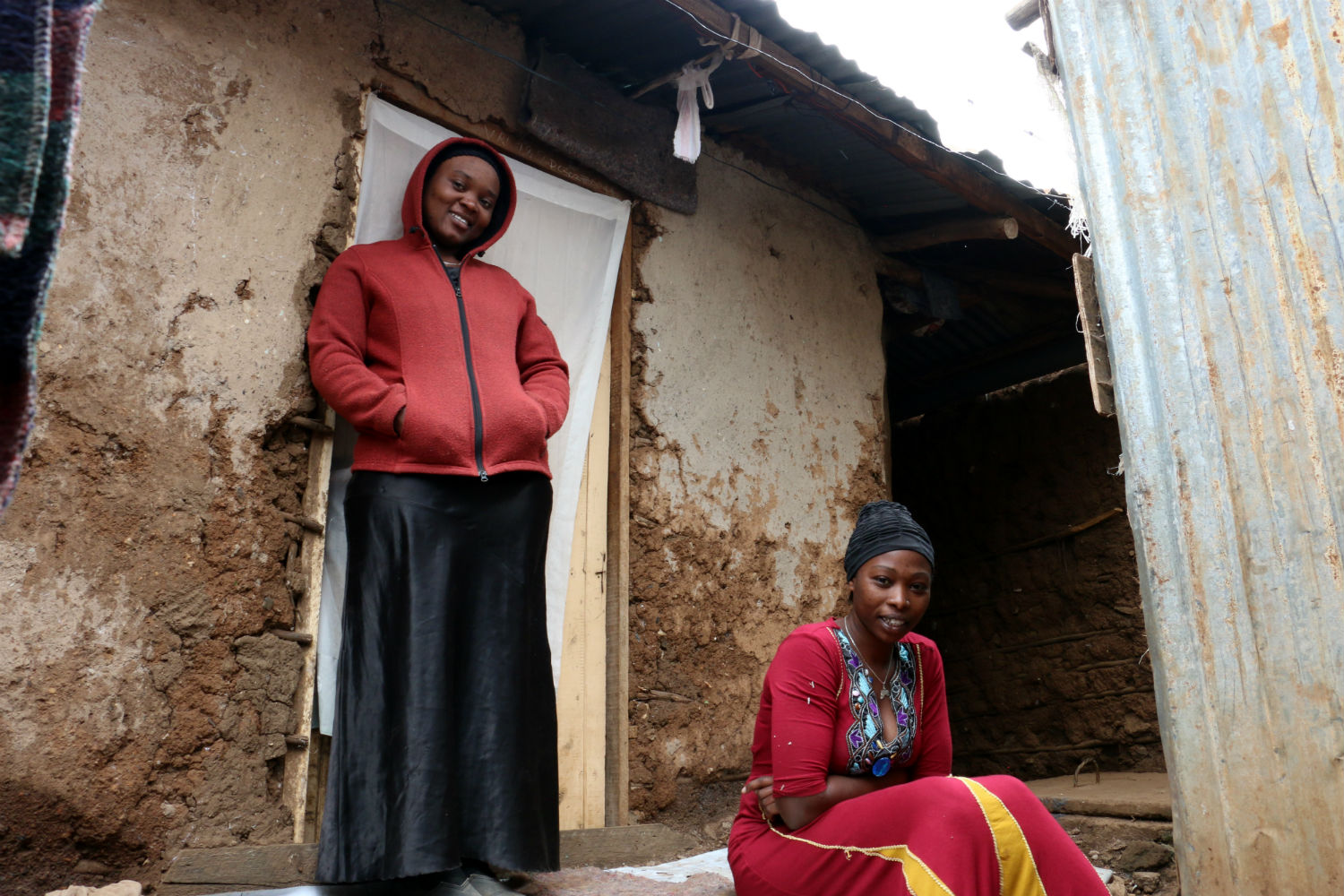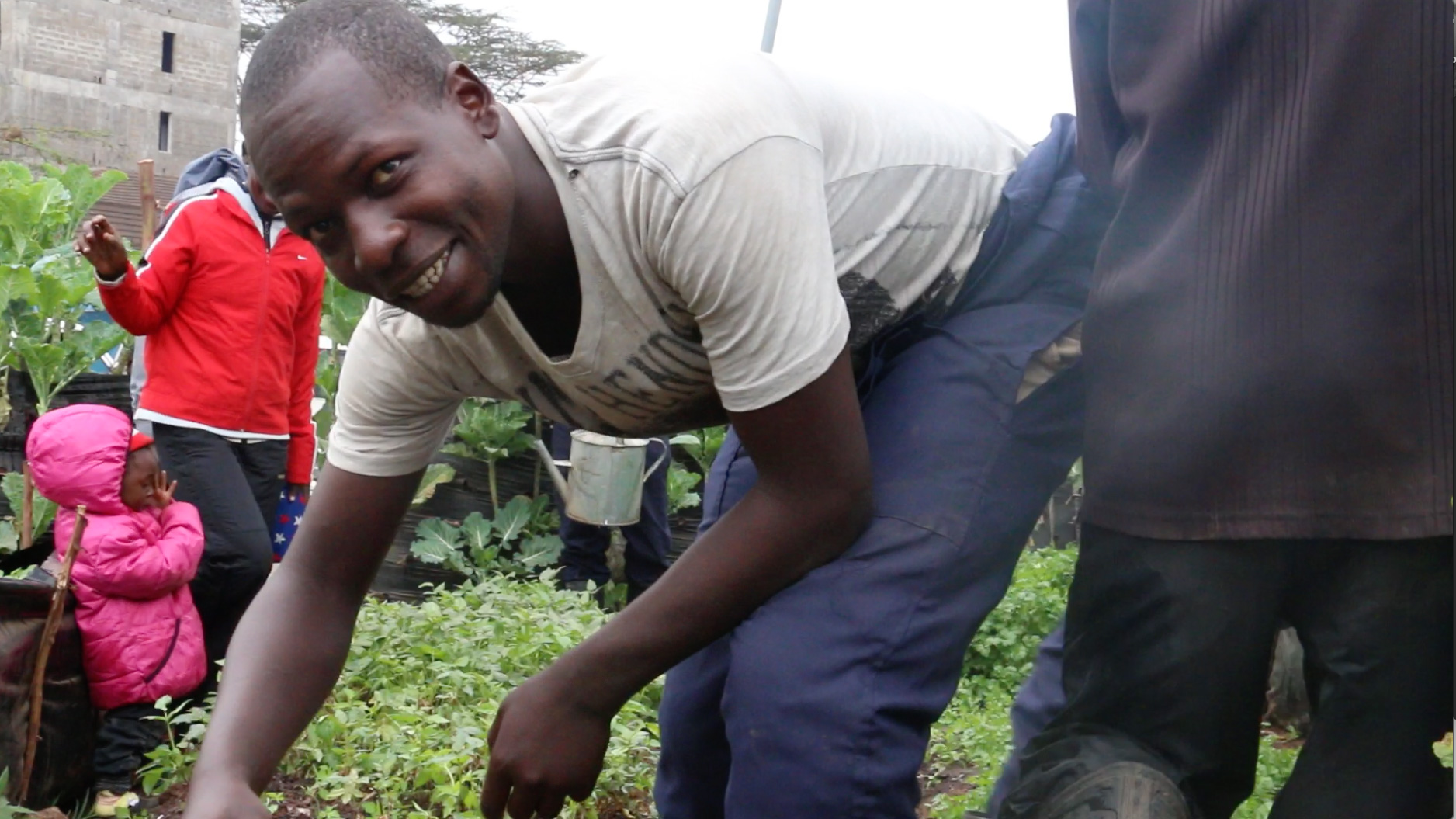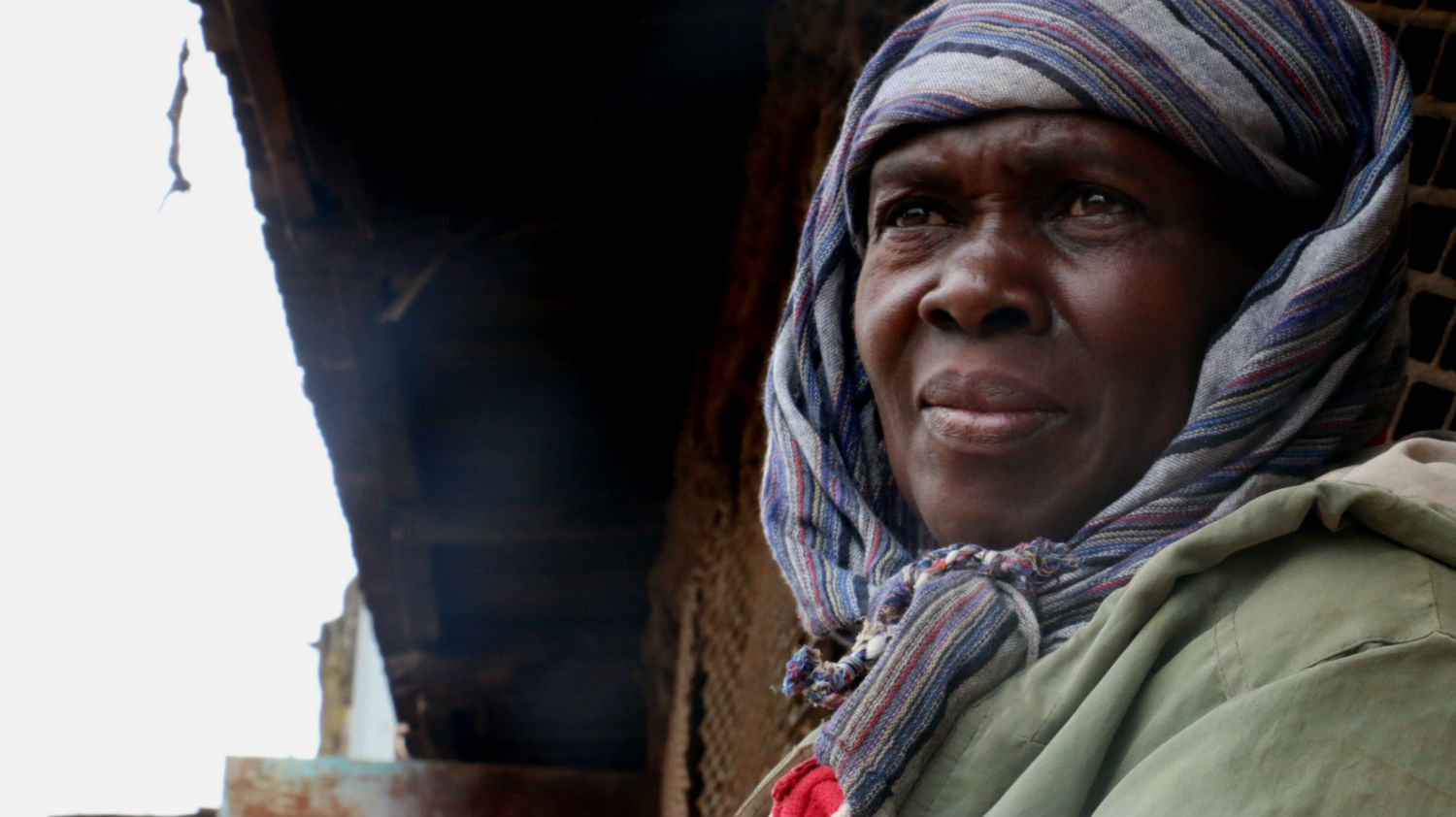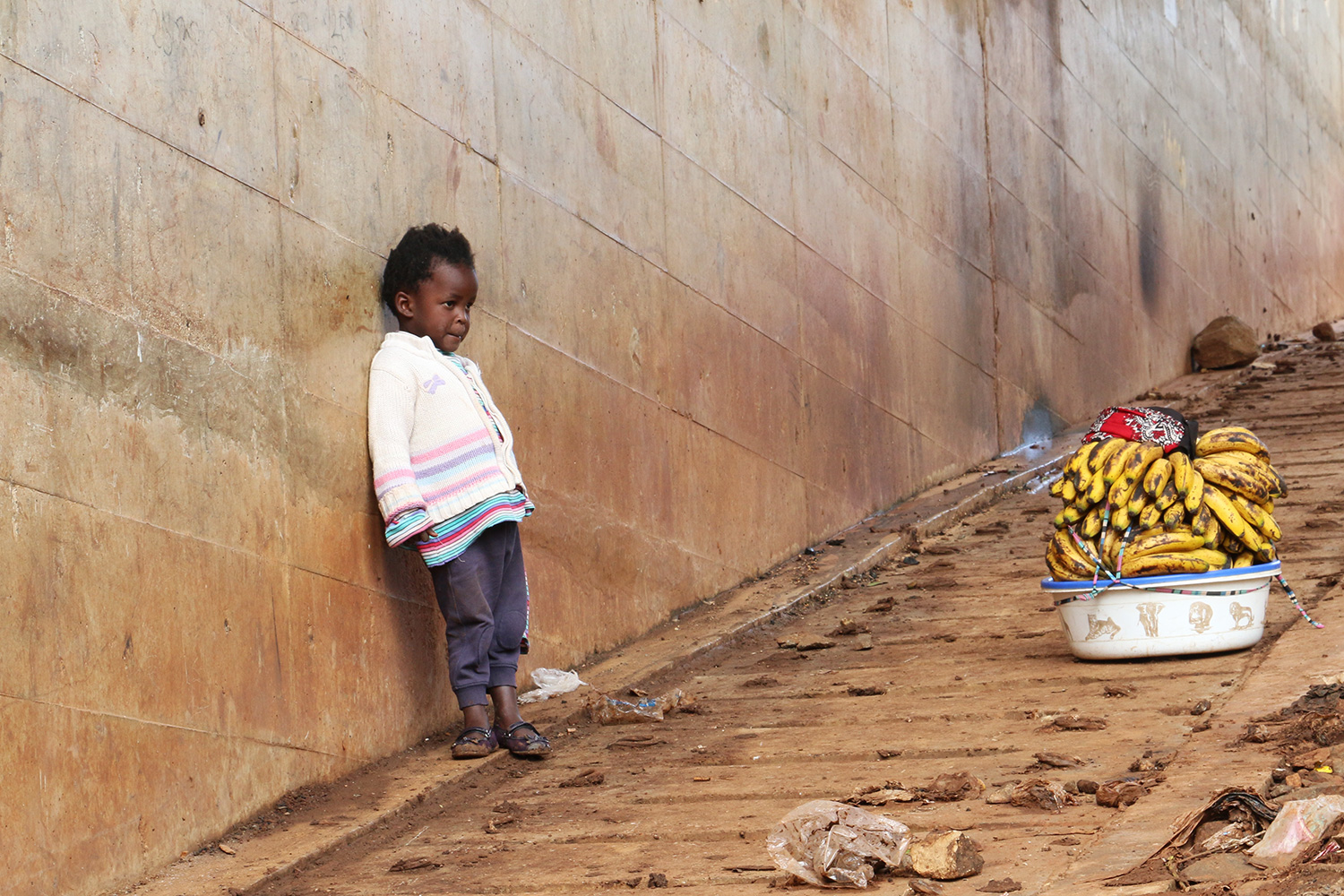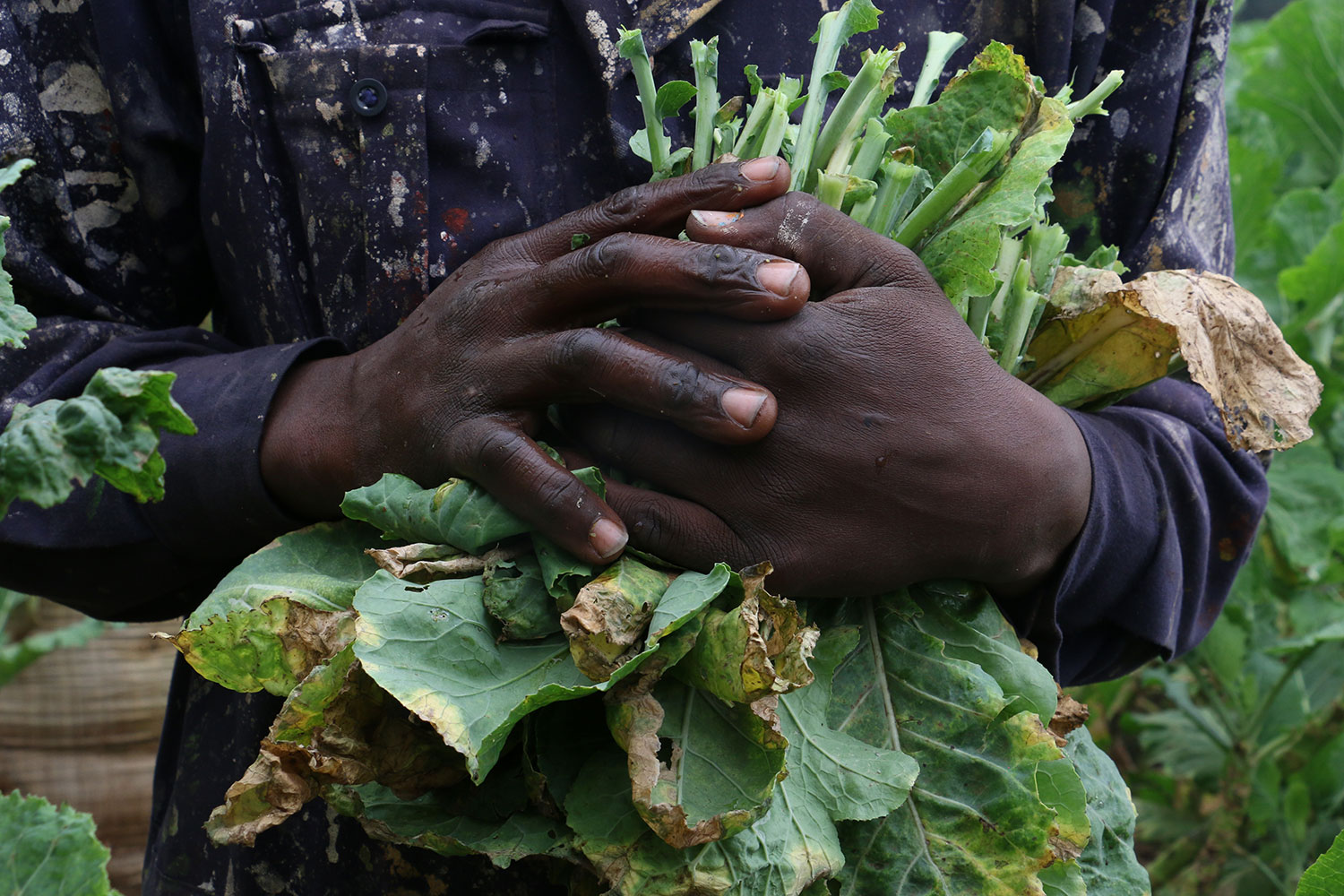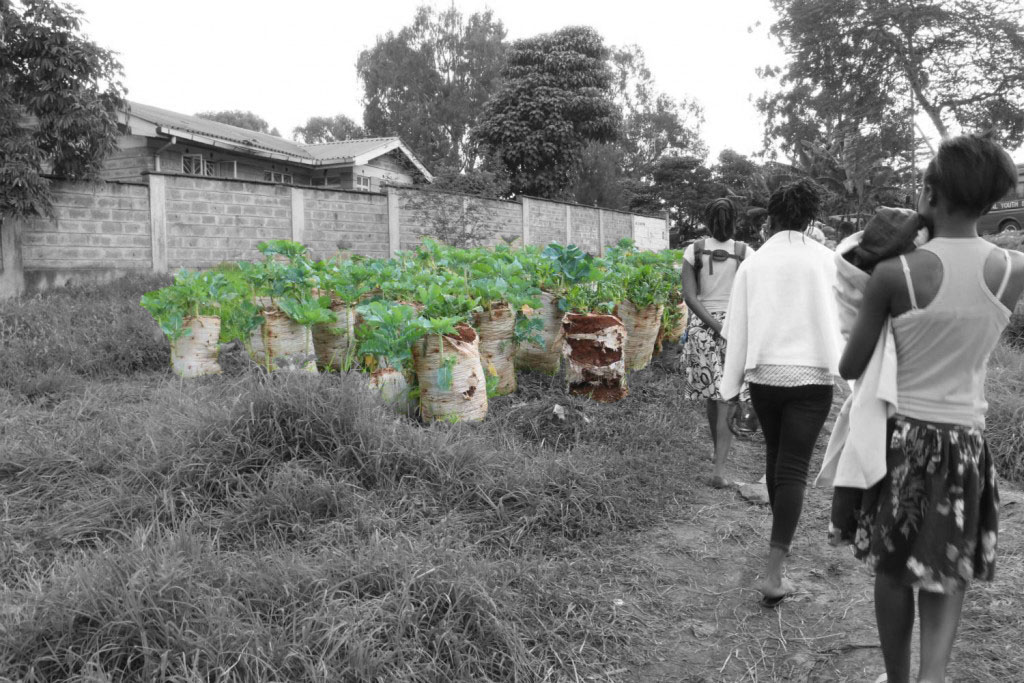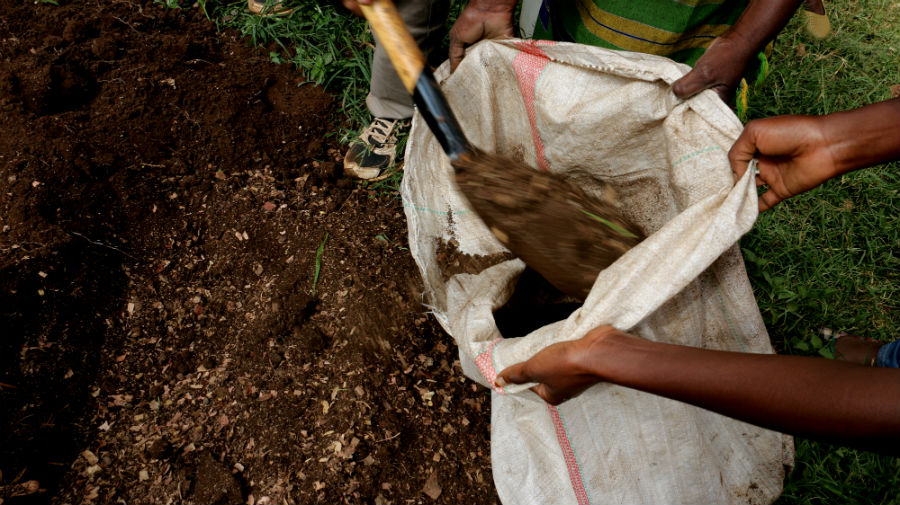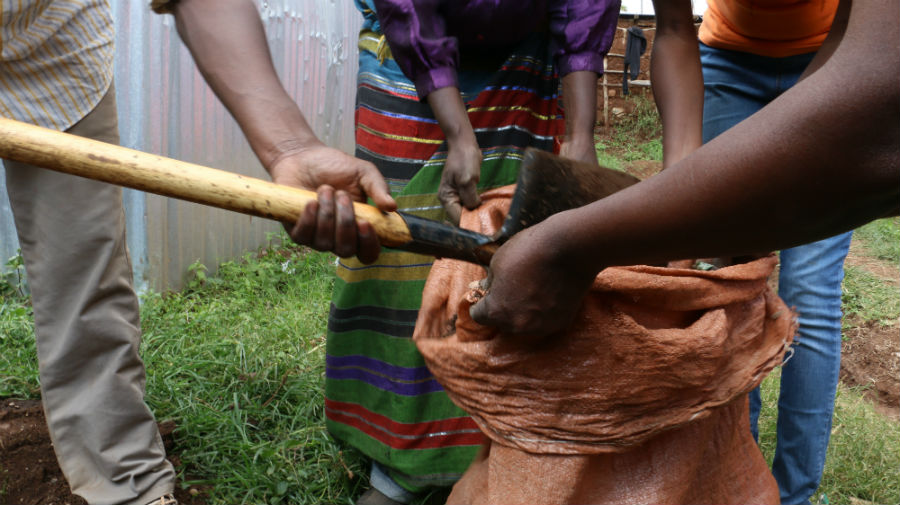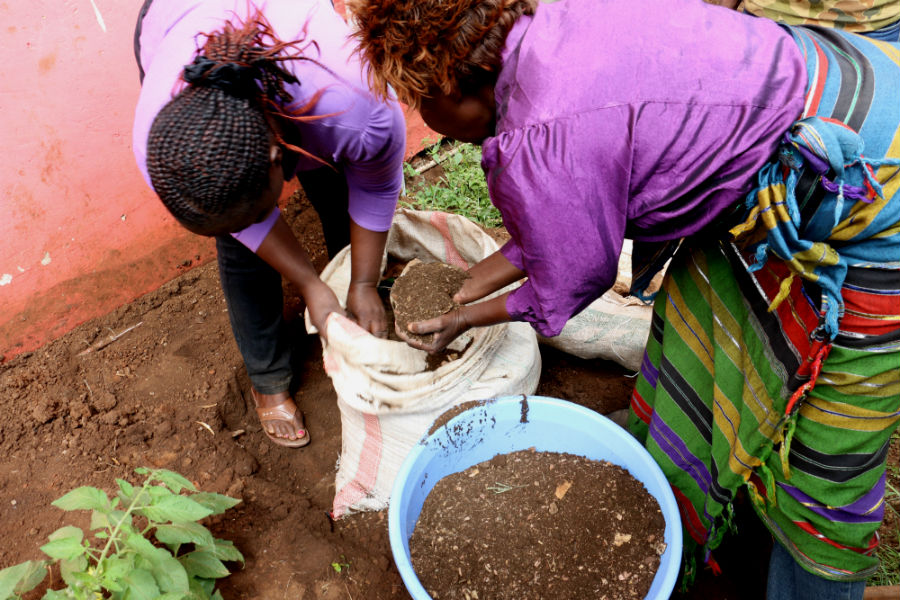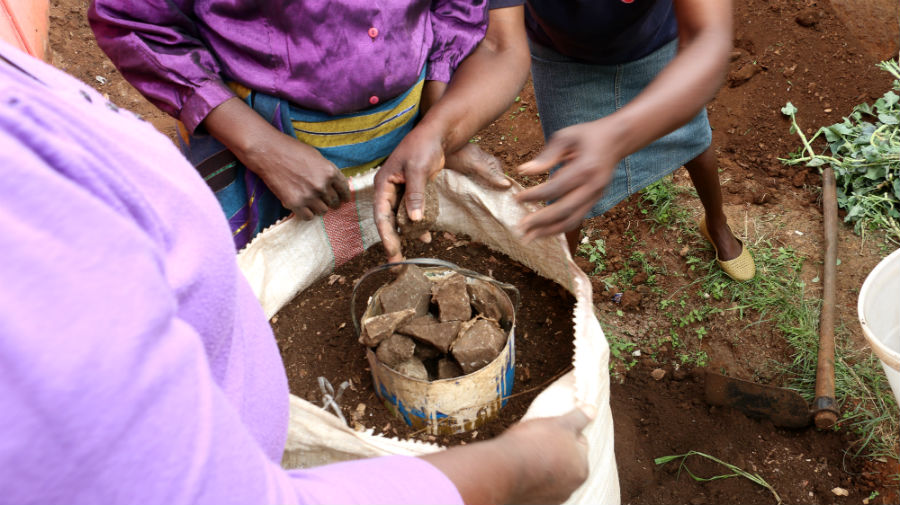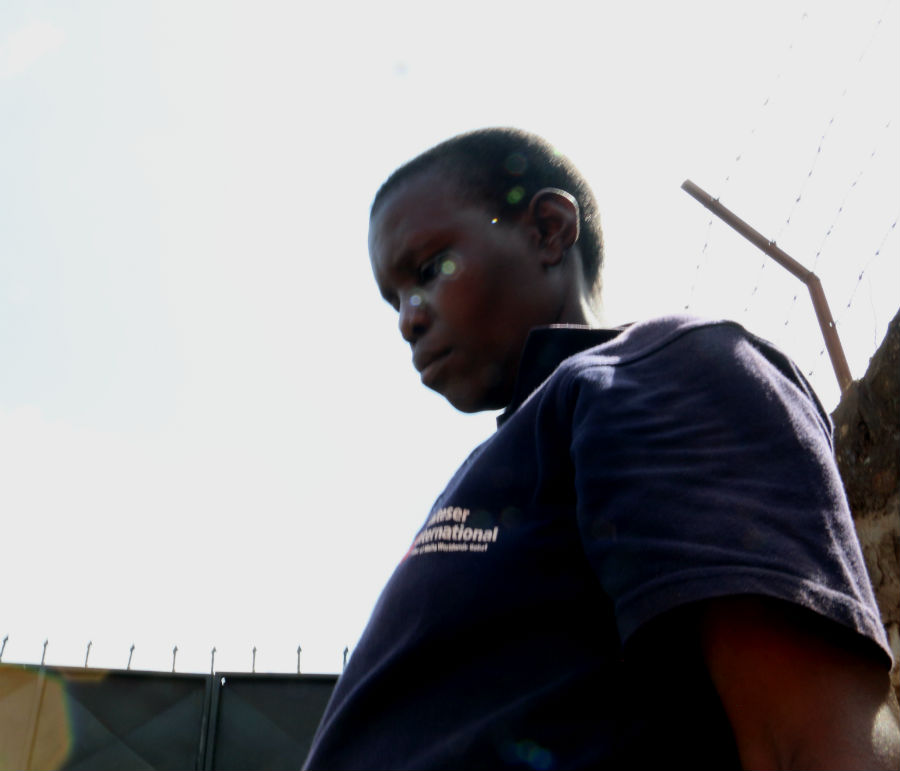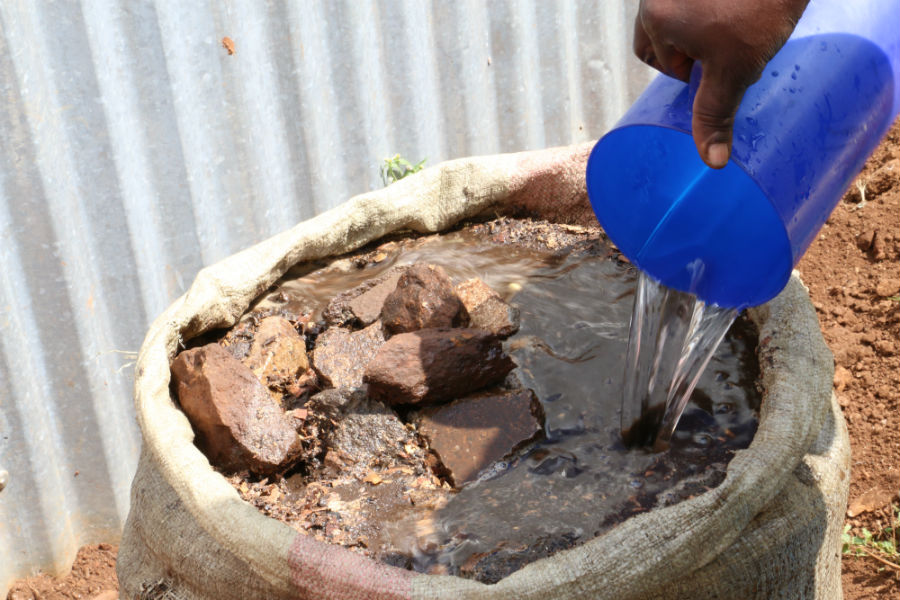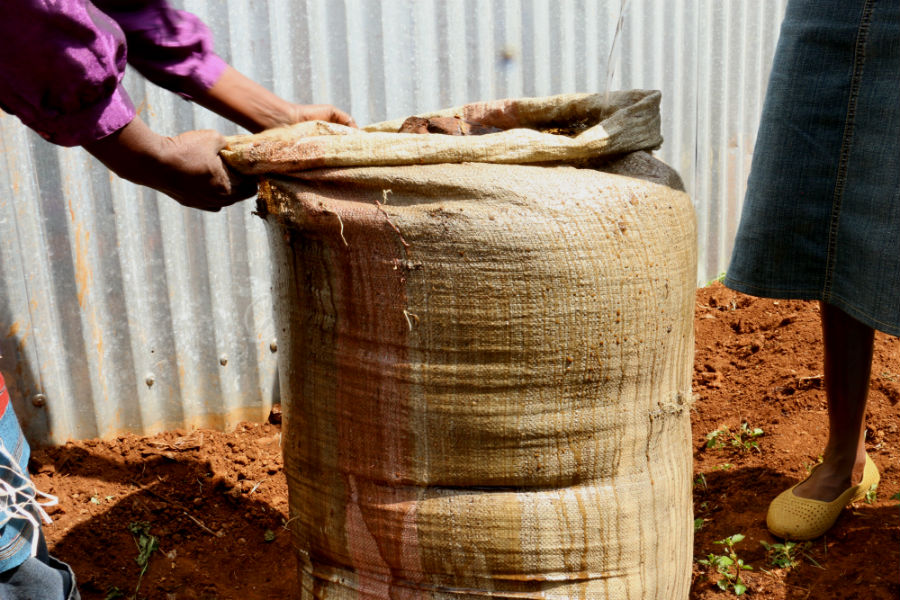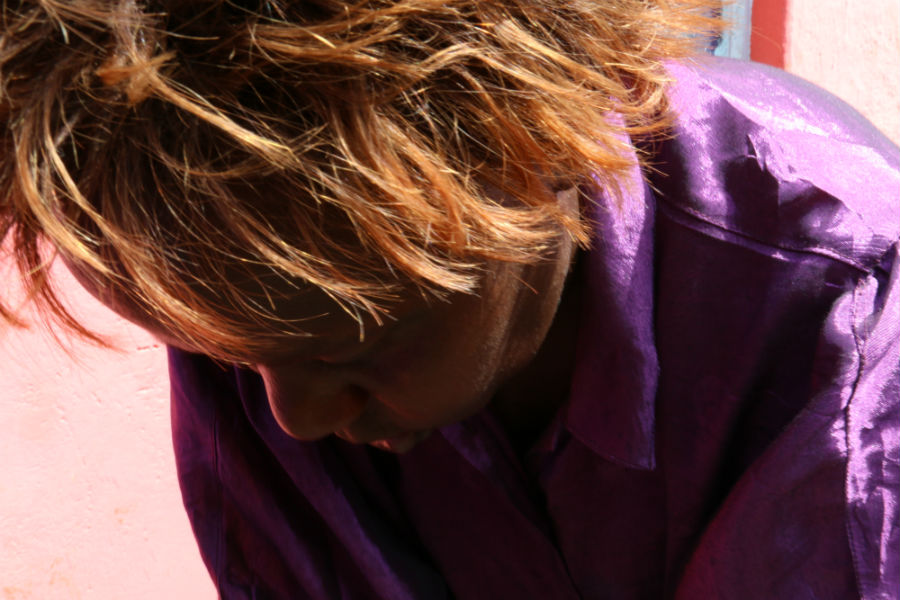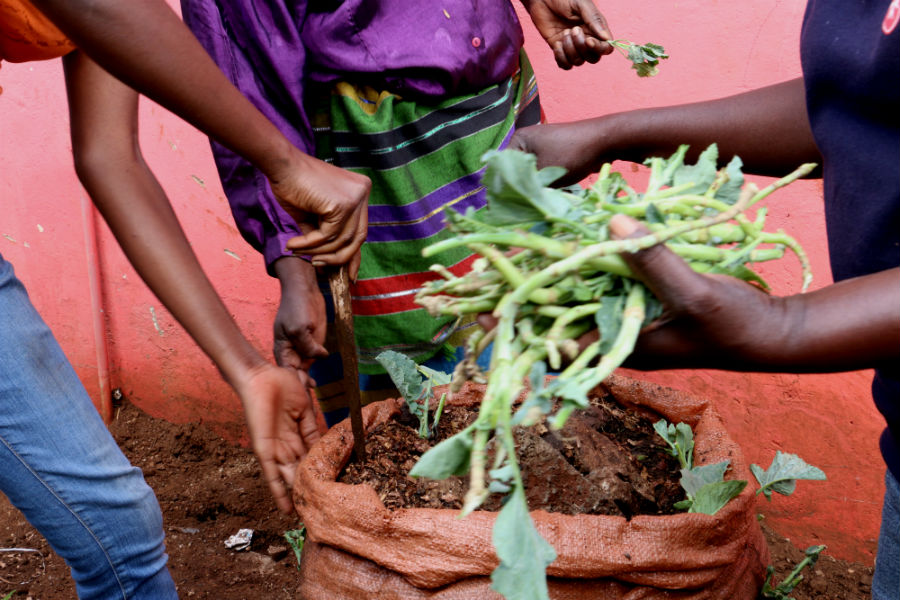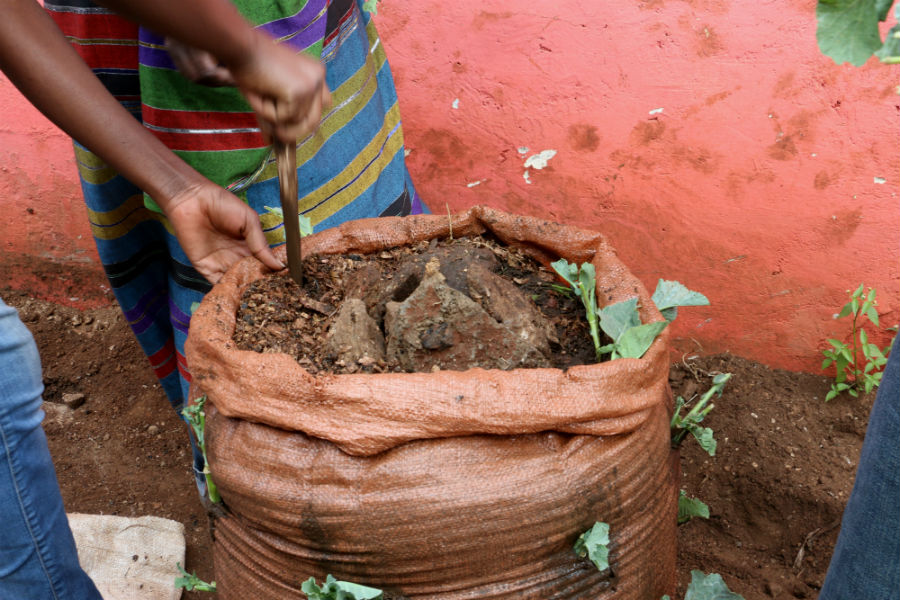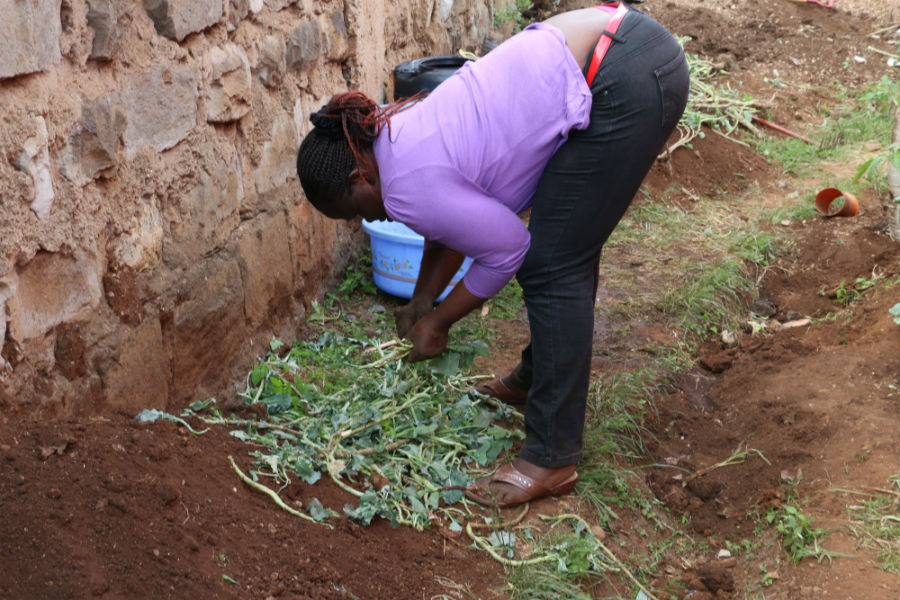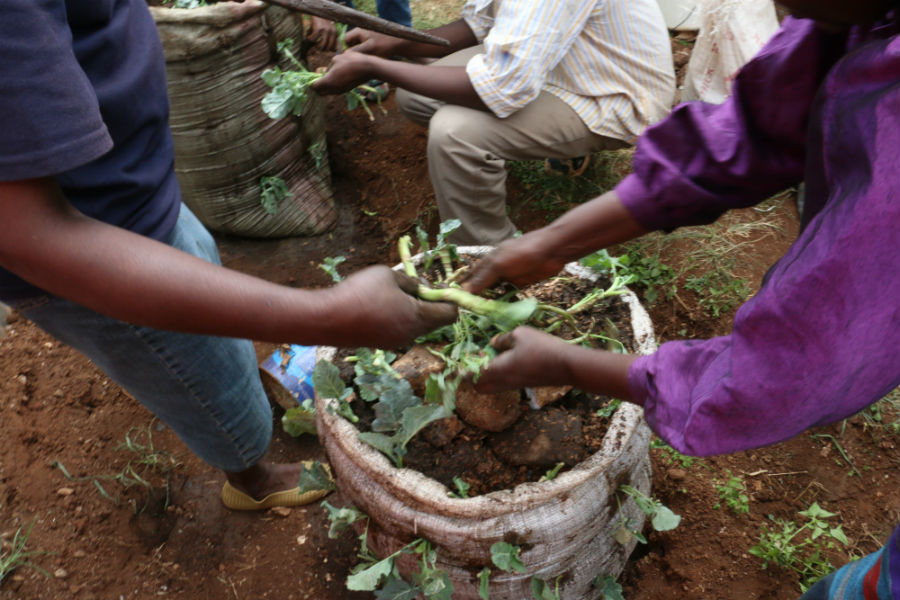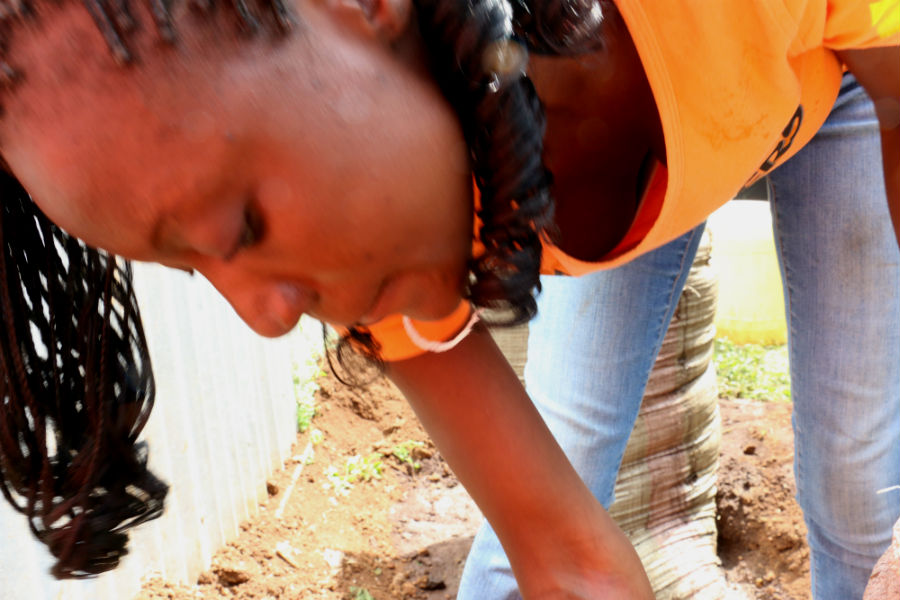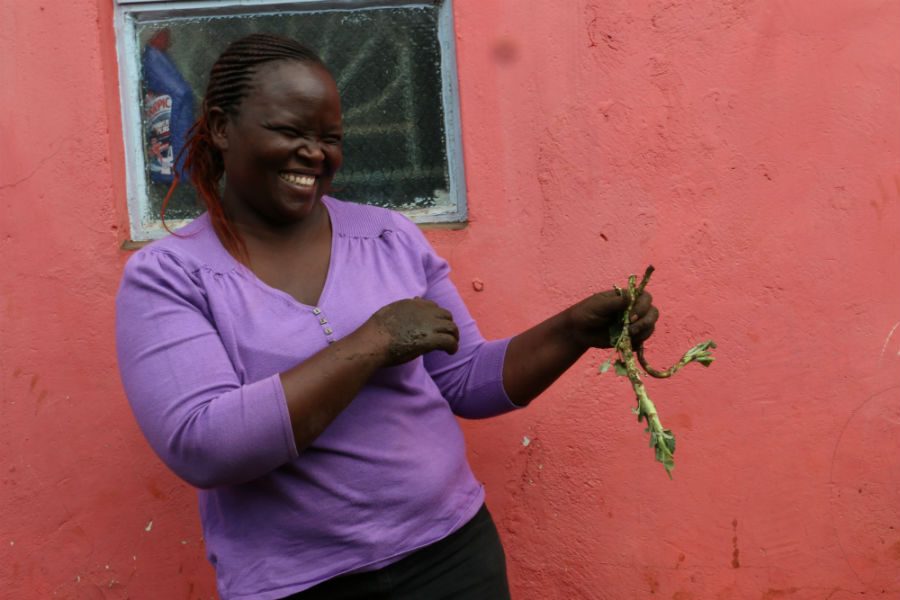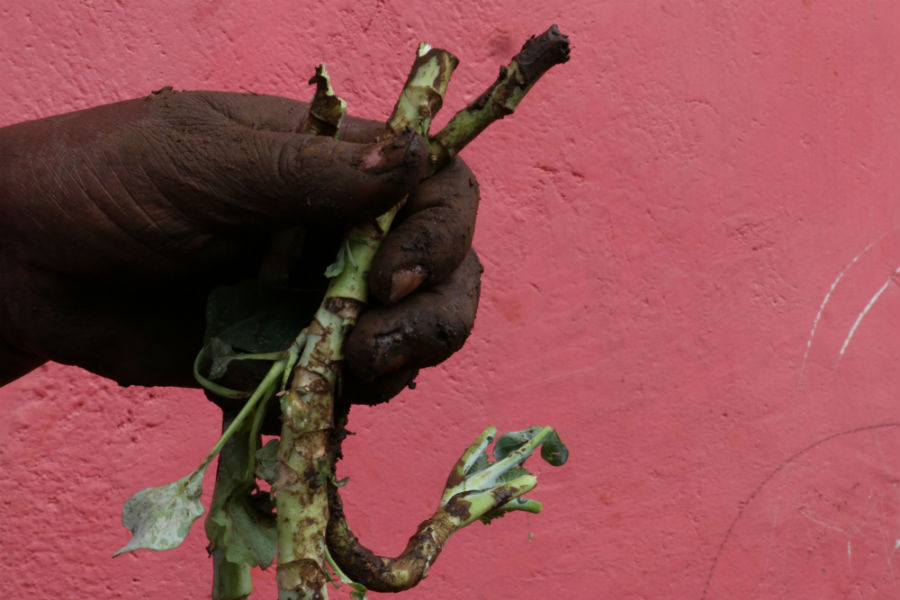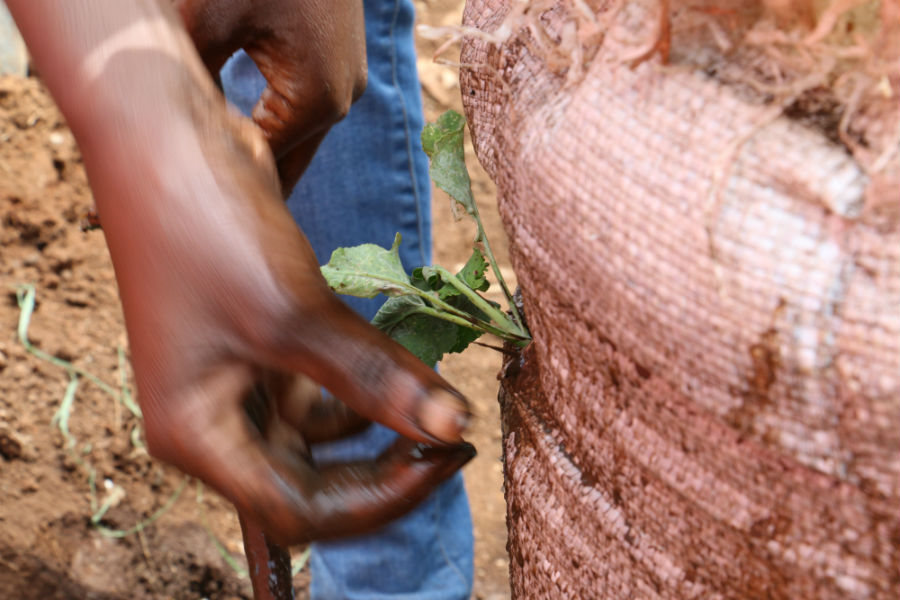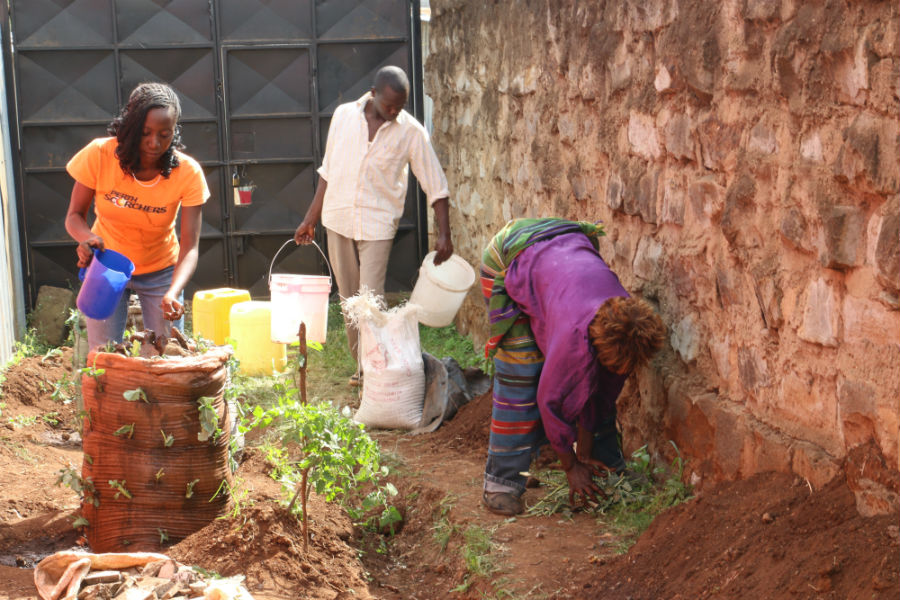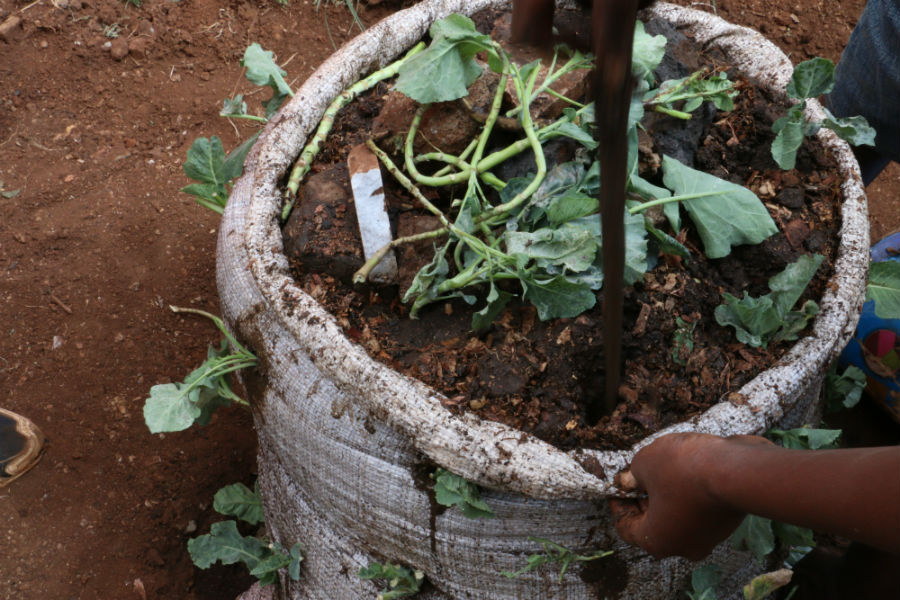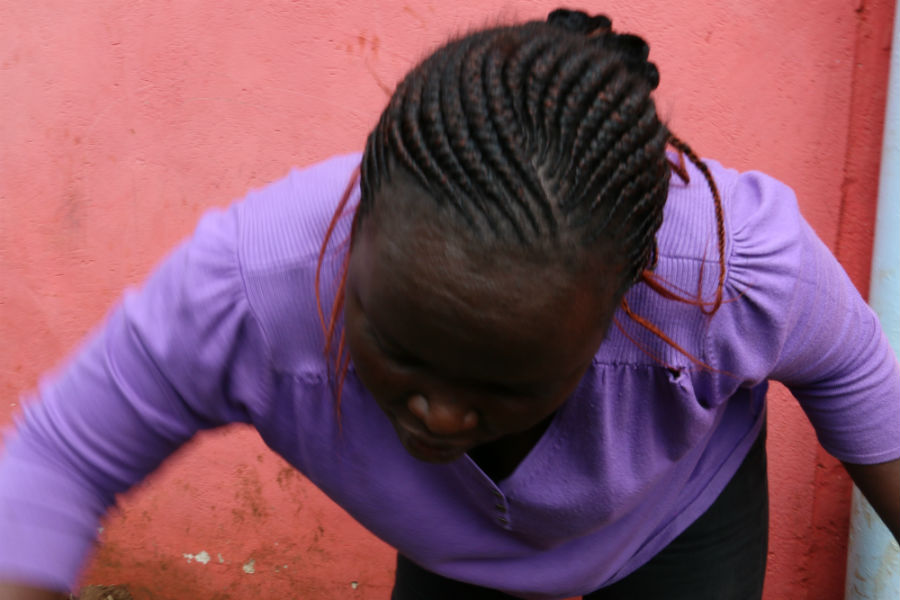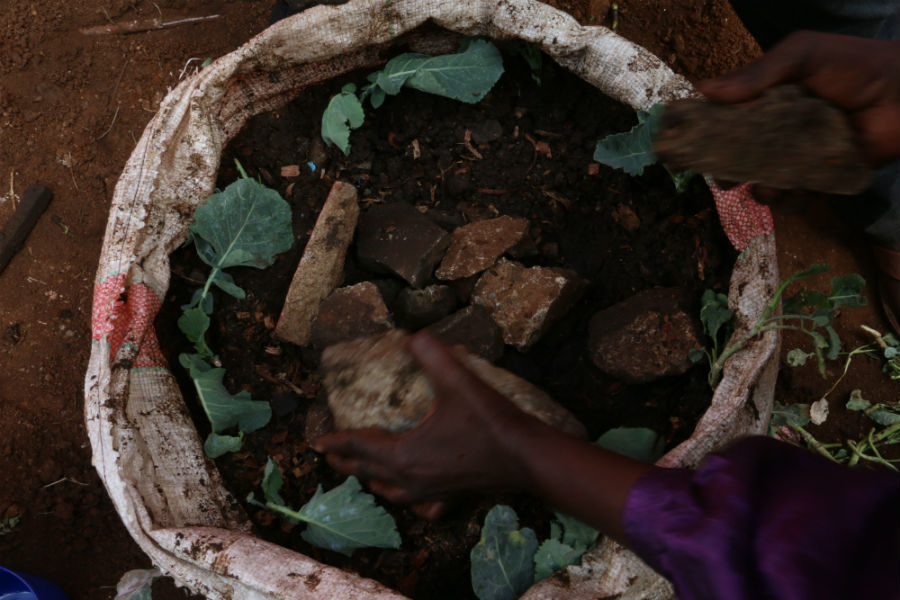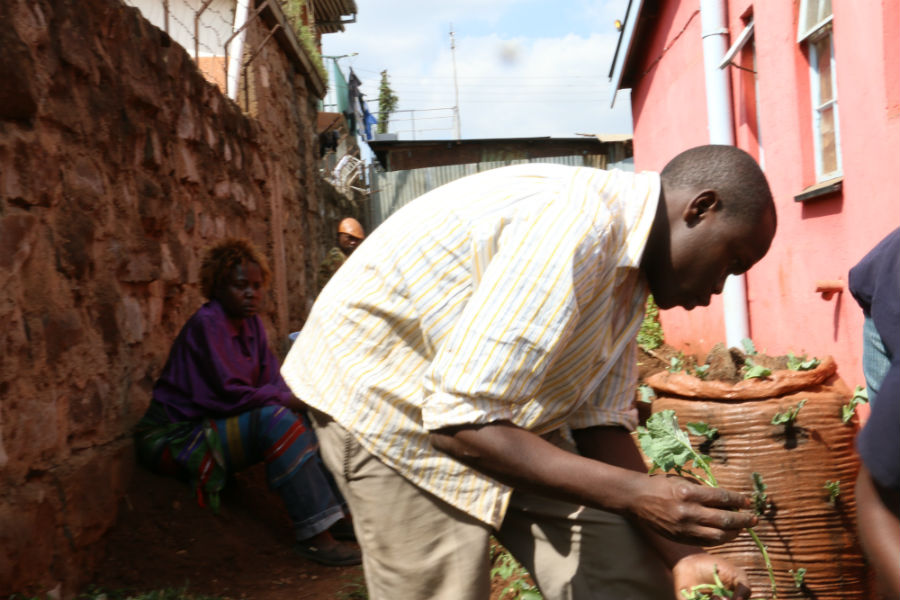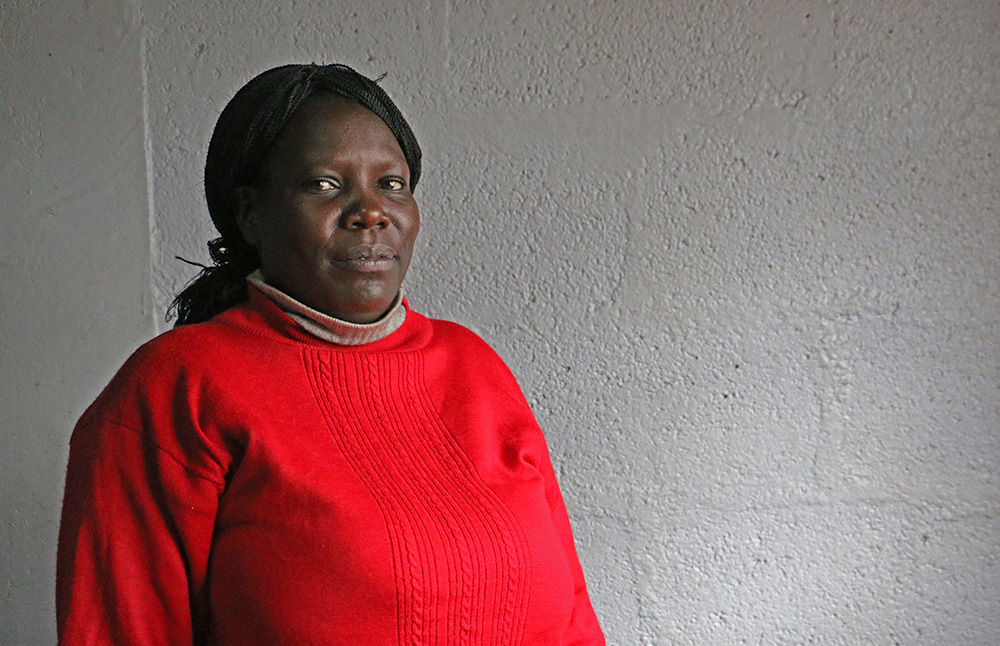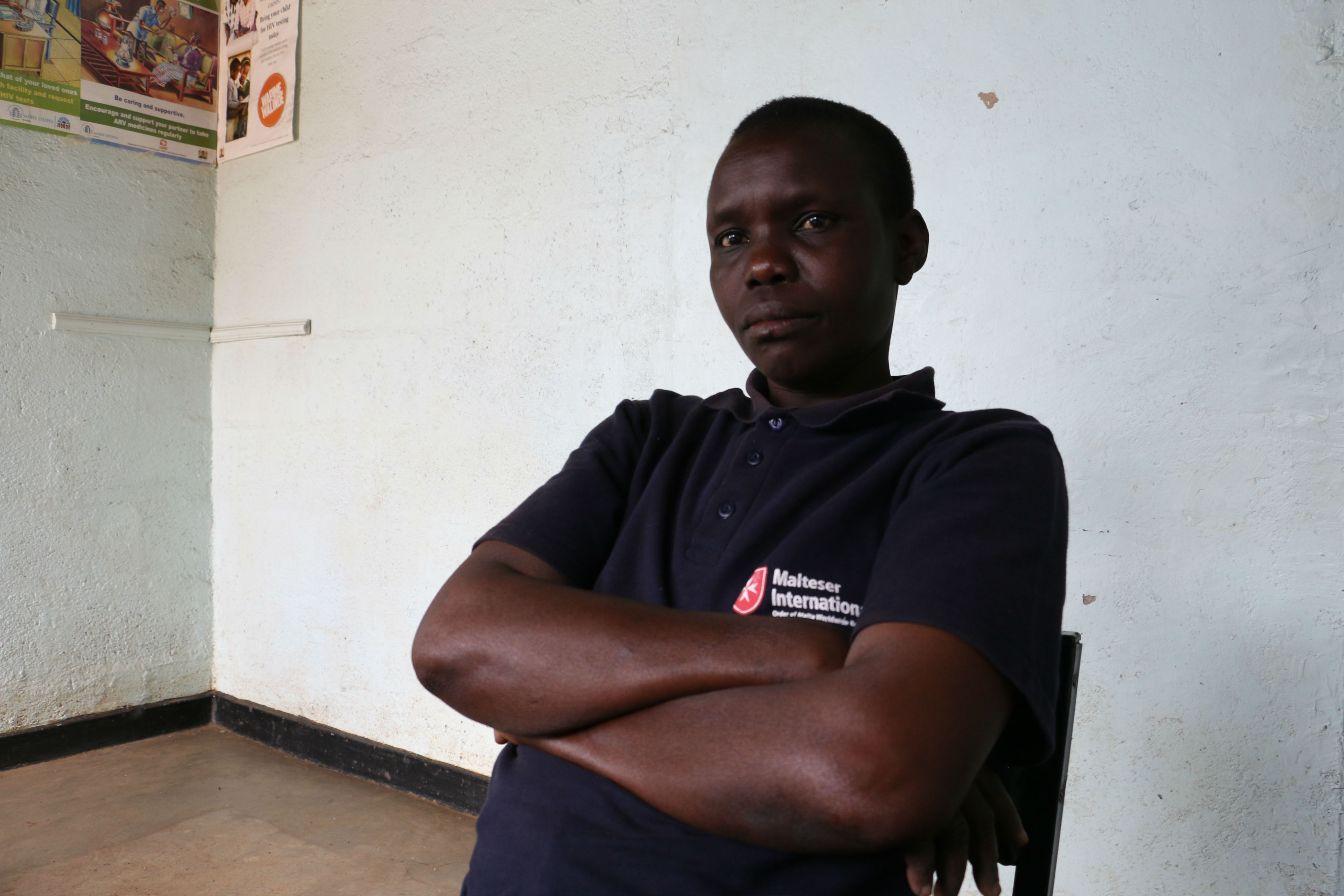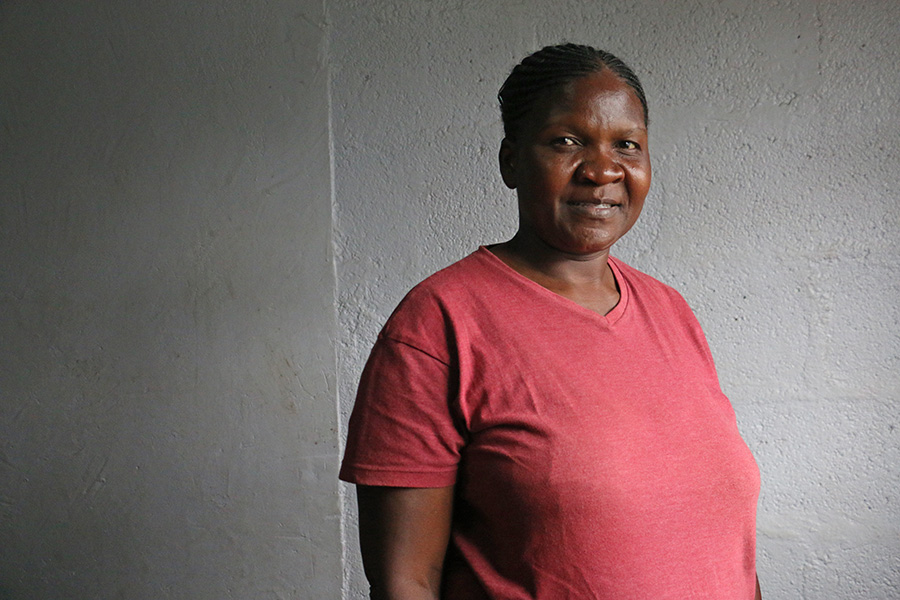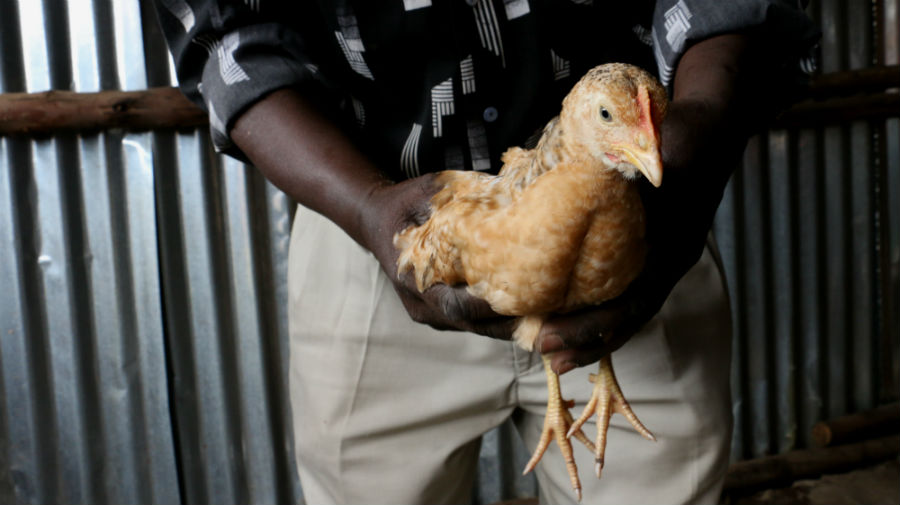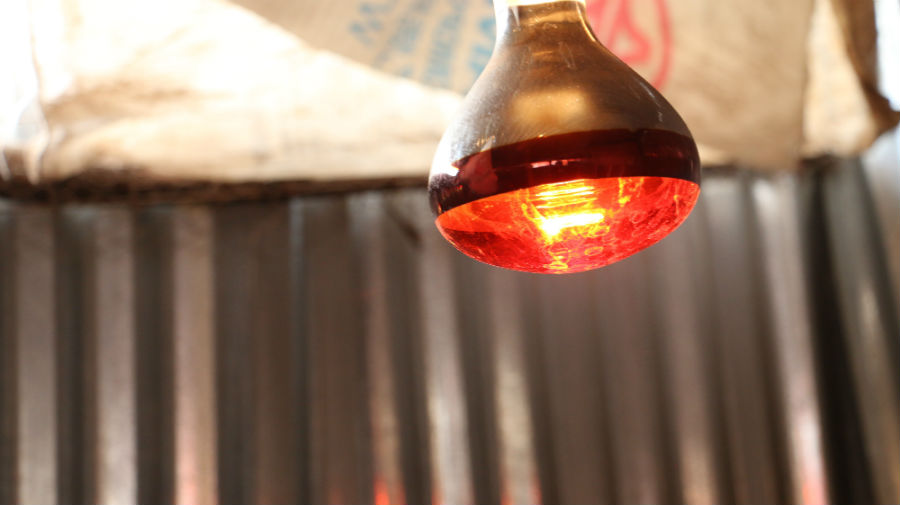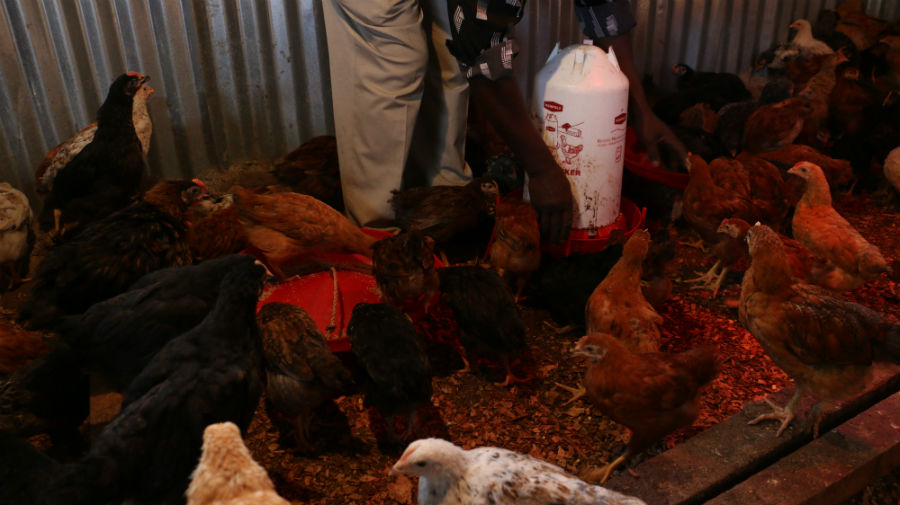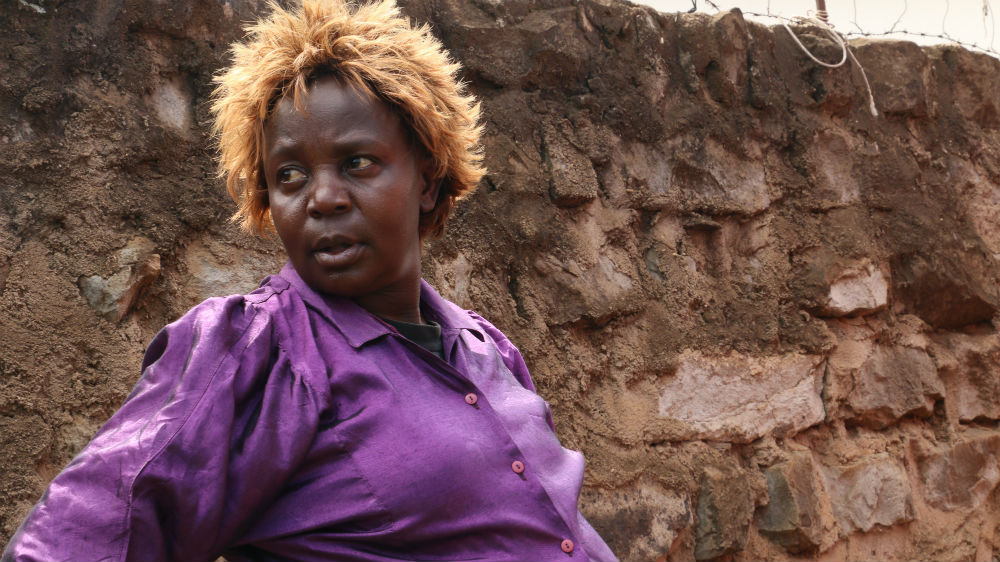
Maggie: From sex worker to sack gardener
Margaret “Maggie” Ochola is 47. She came to Nairobi when she was 18 years old; nearly 30 years ago. Maggie has always been a business woman. But, when she came to Kibera in the early 2000’s she wasn’t farming; she was selling her body.
Now Maggie sells kale, onions, tomatoes and chickens. Urban agriculture shifted her life from sex worker to sack gardener.
Click below to hear how Maggie went from sex worker to sack gardener.
She lives in Laini Saba village, one of the most dangerous of the 13 villages that make up Kibera. It is plagued with armed robberies, rapes and murders.
“Sack gardening has changed my life” – Maggie
Her home is nearly a 10-minute motorcycle ride away from Kibera’s most eastern edge.
“It’s right by the mosque. The main Laini Saba one,” she instructed over text message as I headed out to meet her.
The paved road turns to dust as we drive swiftly through the relatively open stretch of road cutting through the sprawling settlement. As we drive, the atmosphere changes. I can tell the people aren’t used to mzungus, the Swahili word for white foreigners. Looks of suspicion and curiosity shoot from both sides of the road as I head towards Maggie’s place. I’m reassured by the protection my guide Abzed Osman’s provides.
He’s riding on the bike too. I’m sandwiched the driver and my guide on the small motorcycle. It’s a situation that in other circumstances might make me uncomfortable, but here it makes me feel safe. This area is known for crime and violence.
We stop. Abzed gets off the bike first and I follow. I instantly spot Maggie. She’s easy to find as she’s wearing her blonde spikey wig.
Maggie’s is a solid woman with gentle features. Her hands greet me. They’re so soft for having worked so hard. We hug and I kiss her big, smiling cheeks. She guides me slowly to the right of the road toward a small wooden door, barely attached to the hinges.
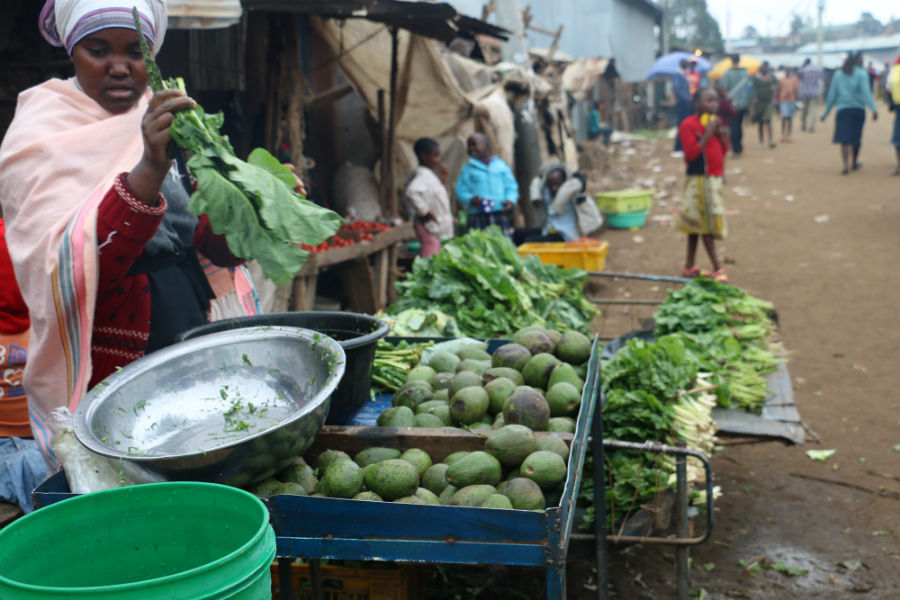
A young girl chops kale and sells vegetables outside Maggie’s gate in Kibera. [Photo © Evelyn Harford]
As Maggie creaks open the door, we duck down and enter. Inside is a large courtyard with entrances to over a half-dozen apartments. Three of them are hers: one for herself and two others for the 20 orphans she cares for.
As she opens the gate we’re greeted by children singing and dancing. Maggie’s courtyard offers a bit of refuge from the chaos on the streets beyond the fence. It’s relatively secluded from the noise and rancid smells from the street. The bright, fresh smell of detergent fills my lungs as women are hard at work scrubbing laundry by hand for not only their own children, but also for the 20 orphans that Maggie has taken in. The yard is an oasis among chaos. I feel like there’s hope here.
Maggie sometimes washes clothes for a small payment when her other ventures can’t make ends meet—usually for about a dollar per load.

Laundry dries in Maggie’s courtyard, the smell of detergent is powerfully fresh. [Photo © Evelyn Harford]
Maggie lives in a one-room house, held up with mud walls and covered by a ridged tin roof. A television, bookshelf, couch and armchair are packed into the single room. Dozens of mugs and dishes rest on her television stand— a small glimpse into all the mouths she has to feed.
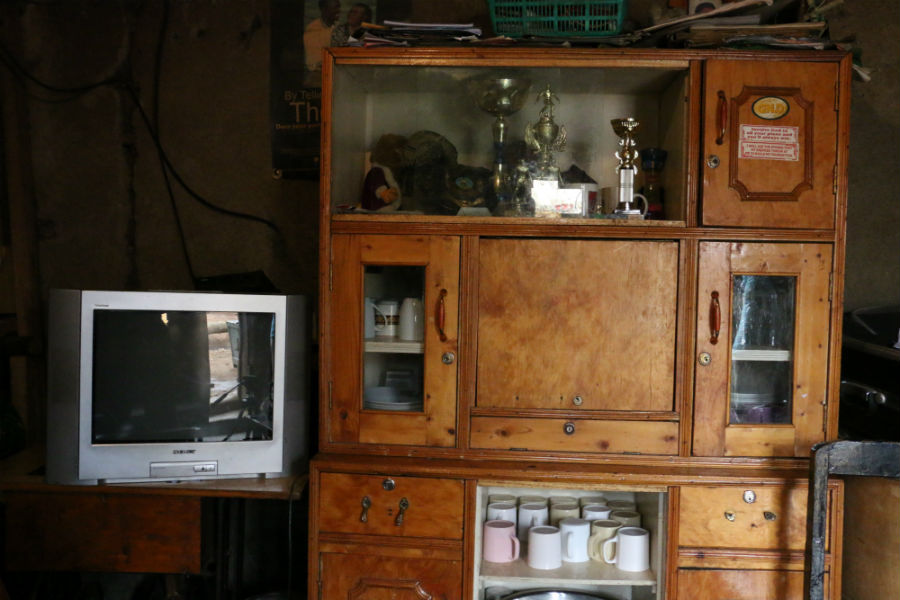
Maggie stores lots of cups and dishes to feed all the orphans she cares for. [Photo © Evelyn Harford]
She’s part of a growing number of intergenerational, female-headed households in sub-Saharan Africa. She cares for children left in the wake of the AIDS epidemic within Kibera. An estimated 14 per cent of those living in Kibera are HIV positive; nearly double the national average, according to the HIV Comprehensive Care Center operating out of Kibera.
Maggie relies on her own funds to take care of AIDS orphans; a personal crusade for her.

Angela holds up the antiretroviral drugs used to manage her HIV. [Photo © Evelyn Harford]
“I started when my brother and his wife died of AIDS, and started living with my brother’s orphan,” she says.
Maggie, despite over five years practicing unsafe sex in a Kibera brothel, is HIV negative; a statistic that defeats all odds. Her HIV negative status and past in the sex industry allows her to care for those suffering in the final stages of AIDS and to do so without judgement. Many who suffer from the disease experience social isolation, leaving them without care in their final months, weeks and days.
Maggie takes in children who are left behind when her patients die. As one of her many part-time jobs she works as a homecare provider with Laini Saba Project and Homecare (LAPCA). The organization’s office is located in Kibera, about an hour’s walk from her home. In addition to providing homecare for those suffering from HIV-AIDS, she also spreads awareness about HIV-AIDS in her community.
Her activities with LAPCA allow her to expand her urban farming initiative using the yard at the office. The land is rented by LAPCA through funds from the Red Cross, foreign governments and other miscellaneous international and domestic donors. To care for her children, Maggie relies on volunteers and donors in the community and on earnings from the urban farm.
Many people who live in Kibera have multiple jobs, or volunteer in their community for no pay when they can’t find formal employment. It is dizzying to think about all the work many in Kibera do without being recognized by pay or acknowledgement from the larger society.
Maggie is a self-starter and a change maker for the women in her community. She doesn’t expect to be rewarded, but hopes her contributions will help make a better life for her orphans and community.
“We were just working in it for free and nobody had funded us to do it,” says Maggie. “But, we still like farming very much.”
Maggie is blessed to have a large yard inside of the LACPA compound. Most urban farmers are confined to smaller spaces. Space is the biggest barrier for urban farmers in Kibera. Most houses are either touching, or are divided by small, snaking pedestrian pathways.
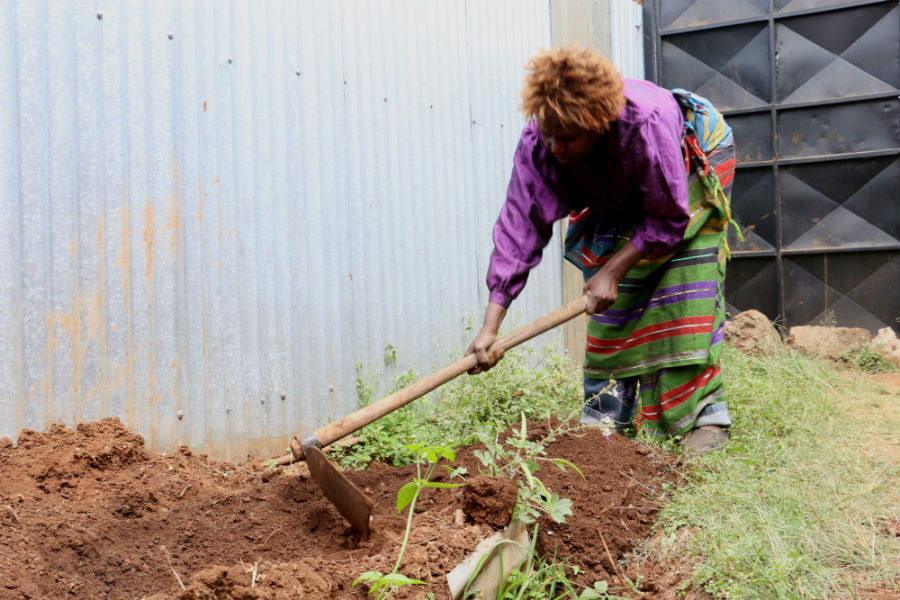
Maggie hoes the earth to place into newly prepared sack gardens. [Photo © Evelyn Harford]
The land she uses is not hers. Officially, the land on which Kibera is built is owned by the Kenyan government. Kibera was an informal settlement for “native” Africans to live on Nairobi’s outskirts when the British colonial powers ruled. Laws were passed when Kenyan independence took place in 1963 to permit the eviction and removal of Kibera’s residents but its residents continued to live there despite this law. Because the government couldn’t remove them, the settlement has continued to grow to this day. Legal housing in Nairobi was, and still is, unaffordable for many who move to Nairobi from rural towns and villages. Since the formal housing market couldn’t absorb the large numbers of urban poor, the government was forced to accept the informal settlement within their city. Just like in the 1970s, residents who live in Kibera pay rent to de facto landlords who rent out plots of land that don’t actually belong to them either. Many landlords don’t allow their tenants to grow sack gardens on their doorsteps, and in many cases there is not even space to fit half metre by half metre sack garden.

Tight pathways weave between people’s homes in Kibera. [Photo © Evelyn Harford]
Sack gardens are the most common type of urban farming in Kibera. Maggie’s sack garden contributes to the estimated 10,000 sacks within Kibera, reported by Lucy Mbrgua, Kibera’s agricultural ward officer.
The sacks Maggie grows yield kale, onions, tomatoes and other types of produce. When I visited her she was in the process of planting new sacks.
Photo Gallery: Maggie and her group members at LAPCA plant new sack gardens. [Photo © Evelyn Harford]
A farmer can simply buy or reuse a large plastic rice sack and fill it with soil. They don’t take up the same amount of space as traditional plot gardening, which makes them ideal for growing in the tight spaces of Kibera. Maggie is able to have nearly a dozen because of the space provided to her at the office where she volunteers.
“Sack gardening has changed my life because when I need some vegetable, I do go to the sack and pick it,” says Maggie. “And when it is many, I even sell much, I can sell even $7.50 CAD or even $3.00 CAD, and that money if I save it with it group saving and loan I pay it rent through it and I buy food.”
Maggie and the volunteers save profits together at a local bank. There, they can save and invest in group projects, as well as, pay out to group members needing to pay bills.
Rent can be very costly for a larger space like the one Maggie has at the LAPCA office. An average rent, 3 metre by 3 metre mud-walled shack is about $10 per month for a 3 metre by 3 metre mud-walled shack. It might not seem like a lot, but given the fact that the average daily income is $1.30 CAD, this represents approximately 27 per cent of one’s monthly income.
But Maggie’s work and income stemming from her urban agriculture projects, like many others, is not secure if the government decides it wants to evict her from the land she occupies in Kibera or, if she, or LAPCA cut ties with each other. She has no ownership or security in her investment on the land since officially the Kenyan government owns it. Many have a hesitation to invest in urban agriculture because of this lack of security. Maggie has taken the risk to serve herself, her family and community. For her, it’s worth it.
This space has not only allowed Maggie to expand her activities but also to train other women how to farm in this environment.
Photo Gallery: Women that Maggie has trained through LAPCA. [Photo © Evelyn Harford]
“Through farming and selling and through teaching, and also through knowing some colleagues, it has helped me to plant,” says Maggie. “They were really happy about it.”
Farming has changed her into a community change maker, just like the woman who introduced sack farming to Maggie in the early 2000’s. The work improved her confidence after it was crushed by her work in the sex industry.
“I am free in my work. I’ve become a teacher of the others, and unlike in the club, if you go there you are ashamed of yourself,” she says. “You don’t want somebody to know you are going there. It is a big change. ”
She donates some of her produce to other women in the community. She knows that people who suffer from HIV-AIDS survive longer when they have good, nutritious food to eat.
Maggie also lets the HIV positive women who suffer from poor nutrition to pluck vegetables from the sacks at the LAPCA office as a way to help give them a better, longer life.
While Maggie spends a lot of her time caring for in her community and the 20 orphans, she is also the biological mother to Marissa. She met Marissa’s father in a brothel when she was a sex worker.
“He has three wives, so I couldn’t stay with him,” she says. “He lives in Kisumu.”
Kisumu is a province over 300 kms northwest of Nairobi, bordering Lake Victoria.
After leaving her rural village and divorcing her abusive husband, Maggie knew that she couldn’t rely on a man for income; subsequently she was left a single mother by Marissa’s father.
At first, Maggie was only making about $3 CAD per week as a sack gardener. As she began to grow more produce, she earned nearly $10 CAD per week and she started to raise a couple of chickens in front of her house. With the space at the LAPCA office she’s expanded her poultry production in a medium- sized chicken coop.
In addition to her sack garden, Maggie is now raising 200 chickens.
Chickens are a valuable commodity for urban farmers. Poultry is expensive to buy in the market and live poultry are an attractive target for thieves within Kibera. Security is necessary day and night to keep their product safe. Thanks to Maggie’s helper Albert, her chickens are safe.
Photo Gallery: Albert works to care for the chickens at the LAPCA compound. [Photo © Evelyn Harford]
The future is looking up for her, as long as she can keep her relatively large piece of land within Kibera.
Maggie dreams of moving back to her rural village one day. She says if she can get enough money and buy some land she would leave the settlement. Living in Kibera isn’t ideal; this isn’t the dream she had for herself when she left her rural village over nearly three decades ago.
Click on an image below to discover the next story.
